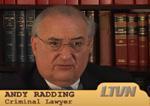"It's Called Disclosure"
DEFENSE LAWYER: I sure would like to take a look at your files.
PROSECUTOR: You would?
ANDY RADDING: There are different rules in different courts in different states and in the federal system of what they have to give you and when they have to give it you.
PROSECUTOR: Shirley, can you xerox all the files on the Gambini-Rothenstein case for Mr. Gambini.
ANDY RADDING: They have to give you scientific tests, documentary evidence. They have to give you the statements of the witnesses that are going to be used against you.
MARISSA TOMEI: He has to, by law you are entitled. He has to give you a list of all witnesses. You can talk to all the witnesses. He is not allowed any surprises.
ANDY RADDING: Certain things are absolute. Any evidence that the prosecutor has, that you may not be guilty of the crime, what we call exculpatory evidence has to be turned over, has to be turned over immediately upon the government getting it.
MARISSA TOMEI: He has to show you everything. Otherwise it could be a mistrial.
ANDY RADDING: That could endanger the prosecution. If we can convince the judge that they violated the rule about giving us exculpatory evidence, a conviction, if you are convicted, could be thrown out.
MARISSA TOMEI: They didn't teach you that in the law school either?
What Types of Evidence Must the Prosecutor Disclose?
Recognizing that a prosecutor who withholds key evidence from the accused deprives him of his constitutional right to a fair trial, the United States Department of Justice requires that federal prosecutors disclose "exculpatory and impeachment evidence when such evidence is material to guilt or punishment." According to its internal guidelines, "this evidence must be disclosed regardless of whether the defendant makes a request for exculpatory or impeachment evidence."
Ah, but what exactly constitutes the type of "exculpatory or impeachment evidence" that the feds are willing to hand over? In what appears to be a narrow definition, Justice Department guidelines provide for the disclosure of evidence that "is material to a finding of guilt" only "when there is a reasonable probability that effective use of the evidence will result in an acquittal."
Defense lawyers aren't exactly comfortable with the latitude of discretion this policy seems to afford the prosecutor. So, as you might imagine, both sides often fight over the type of evidence which must be disclosed and when it must be disclosed.
Though the rules vary from one state to the next, and there is even wide variation in how federal prosecutors interpret their own guidelines, prosecutors should disclose the following types of evidence promptly:
- Exculpatory Evidence - which is inconsistent with the charges against the defendant or which may provide a defense to any aspect of these charges
- Impeachment information - that may case doubt on the prosecution's evidence or witnesses or possibly even render the government's evidence inadmissible
If the government fails to disclose this evidence in a timely manner (typically within a very short time after the prosecution gets the information), or conceals evidence that the defense could rely upon in the defense of the action, this type of prosecutorial misconduct may result in a mistrial. My cousin Vinny didn't have this problem, as the prosecutor freely disclosed all of the information and witness statements in his file. But in cases that lack the Hollywood ending, a prosecutor who wins a conviction while concealing this type of information may ultimately answer to a judge that vacates the conviction entirely. And, as one former prosecutor learned the hard way in the now-infamous Duke rape case, it may even cost the prosecutor his license to practice law.


